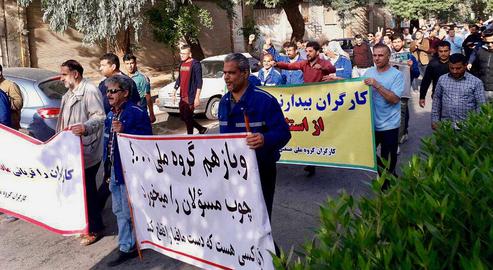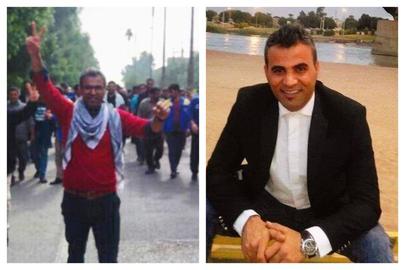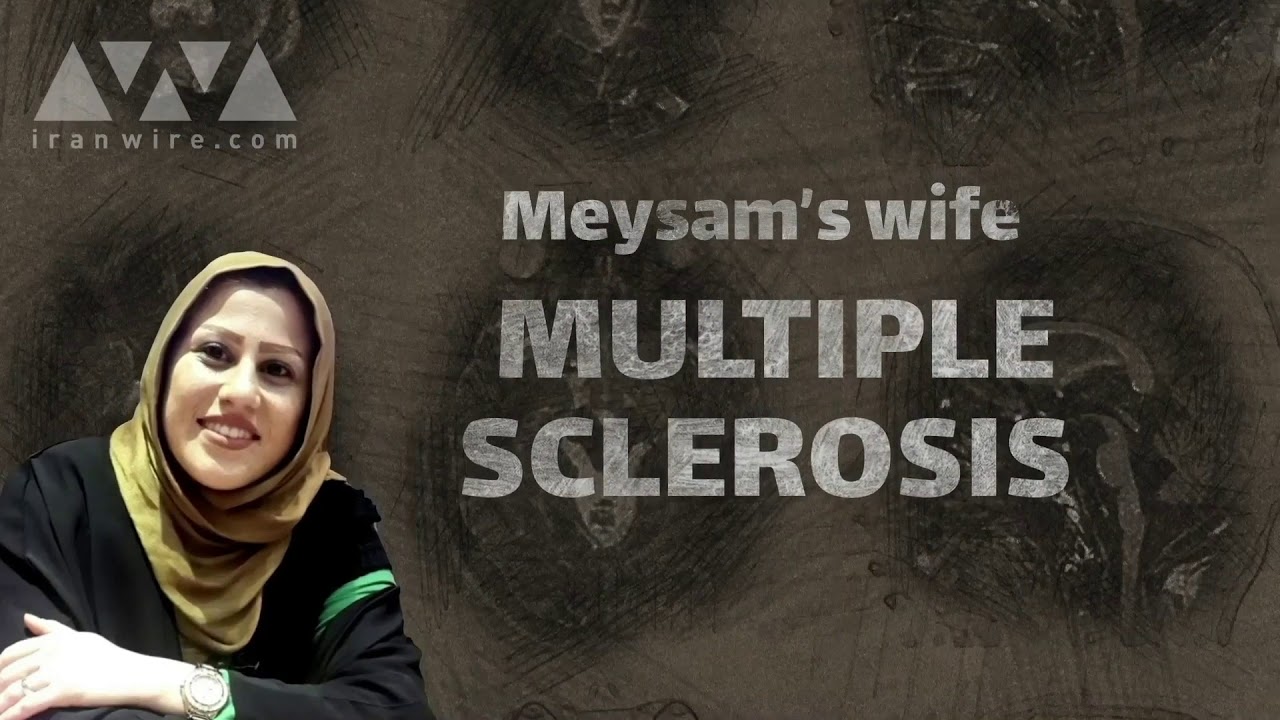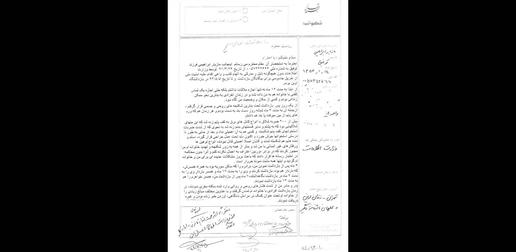Workers’ rights activist Meysam Alemehdi has been in hiding after more than two years of intimidation, harassment, and interrogations — at least one session of which was carried out while he was blindfolded. Among those leading the movement calling for the rights of workers to be upheld, Alemehdi has encouraged his coworkers to continue their protests, despite his own personal hardship, and the hardship his family has endured.
Meysam Alemehdi was born in 1984 and is married to Iman Mousavi. They have two children — Maysa, a girl of 10, and Hazem, a boy of six. He holds the equivalent of a high school diploma and for 11 years worked for Iran National Steel Industrial Group (INSIG), a group of six plants established in 1967 in Ahvaz, the capital of the southwestern province of Khuzestan, to manufacture a variety of steel bars, beams and pipes.
The company has a long history of poor management. It was nationalized after the 1979 Islamic Revolution but in 2009, exactly one year after Alemehdi joined the industrial group, INSIG was privatized and like many corrupt and ill-conceived privatizations under the Islamic Republic, it eventually ran into serious trouble. At first, Amir Mansour Aria, also known as Mahafarid Amir Khosravi, bought the group. Khosravi was later executed in 2011 on charges of embezzling nearly $1 billion, and the INSIG deal had been described as “murky.”
The court then transferred the company to the National Bank of Iran, and in October 2017, the bank sold the complex to Abdolreza Mousavi. Mousavi also owns a major soccer club in Ahvaz and two hotels on Kish Island in the Persian Gulf, and is the managing director of Zagros Airlines. The factory soon became idle under the new owner and stopped paying salaries, which led to protests. Workers complained that Mousavi was not interested in running the steelworks and alleged that equipment was being removed from the complex.
Following the protests, the authorities announced that ownership would again be transferred to the National Bank.
By early 2017, wages had been overdue for a year, year-end bonuses had not been paid, insurance premiums had not been deposited into the fund of the Social Security Organization, and the situation for 600 workers due to retire was unresolved, among other issues. Eventually steelworkers felt they had no other option but to take to the streets in protest. Many were arrested or were fired from their jobs.
Meysam Alemehdi participated in the protests and has gone into hiding to escape arrest. “I have been living in hiding for around eight months,” he says. “They contact the workers all the time and ask them to bring me in or reveal to them where I am hiding.”
As the protests intensified in 2017, the Intelligence Bureau of Khuzestan summoned Alemehdi three times, although he did not tell his colleagues about it. “I gave it a lot of thought,” he says. “I thought if told the workers that I had been summoned they would get scared and would withdraw their demands. Only a few of my friends knew.”
“Helping the Enemy”
Security officials had summoned Alemehdi to discuss ending protests and strikes by workers. According to him, they told him, “You are helping the enemy by doing these things. The enemy exploits your actions.” But Alemehdi adds, “When I asked them how we could get our rights, they had no answers.”
Alemehdi and the other steelworkers could not survive without their salaries. “When Mousavi bought the company, he promised that he would pay our salaries every month but he broke his promise,” he says. “He never showed any good will. He paid us for one month every three months. We have no other source of income and this made our life very difficult.”
The protests continued — and threats and summons by the intelligence ministry increased. “They started making threatening phone calls and summoning workers,” Alemehdi says. “They would call and tell some of the workers they must convince others to return to the factory and to stop protesting on the street. But, basically, the workers all gave the same answer: ‘I am only one worker and there are thousands of workers out there on the streets. How can I make thousands return?’”
On December 14, 2019, as Meysam Alemehdi was shopping at a local supermarket after attending a protest rally, he was arrested by eight security agents. They handcuffed him, pushed him into a car and took him to a detention center. The interrogators asked him about his contacts with his friends, colleagues and the media. “I told them there was nothing unusual about it,” he says. “’As a worker,’ I said, ‘I have the right to communicate with the media so that my fellow countrymen and the authorities will hear me. Where is the crime in that?’”
He says authorities treated everybody as an enemy. “They said: ‘you are either the enemy or the enemy is using you.’ I heard nothing else from them. I have no idea where these interrogators were coming from. I do not know whether they were from the intelligence ministry or somewhere else. I was blindfolded. They wanted me to tell the workers the next day that they should appoint a group of 10 people as representatives and send them to meet with the provincial governor. I refused and told them I would not do this under any condition. They said they would let me know but that I must go and stand on a high place and tell the workers to go to the office of the governor and meet with him.”
Prior to the 2019 arrest, Meysam Alemehdi was one several protesting steelworkers in Ahvaz who were arrested between December 14 and December 20, 2018, and later released. A week before this arrest, Alemehdi was detained after he protested against the arrests of the workers of Haft-Tappeh sugarcane refinery. He was released after spending a few days at the detention center.
Workers’ Answered by Security Forces
On the 38th day of their strike, Ahvaz steelworkers received an answer to their demands — not from the government, but from security forces. From the late hours of Sunday, December 16 to the small hours of Monday, December 17, security forces carried out raids on workers’ homes and arrested many of them. They also carried out arrests on the streets.
“It was a Saturday and all of us workers were protesting on the streets but on Saturday night, when workers were returning home, they climbed the walls and raided the homes of the workers in a synchronized way,” he says. “I was not yet at home and I was walking toward home with a friend. Then I saw the agents’ cars arriving outside the home of [the steel worker] Gharib Hoveyzavi. They climbed the wall to his home and arrested him. We were unable to get close.”
Alemehdi and his friend went to the home of another steelworker and warned their colleagues. “We called and told them that the security agents were going house to house to arrest us,” he says. “We would have been arrested without a doubt if we stayed home.” He says some of the workers did not answer their phones. “It was clear that they had been arrested already,” he says.
Then they went to the home of steelworker Karim Sayyahi. “We saw that the pregnant wife of Mr. Sayyahi was standing in the doorway, shaking from fear,” he says. “It was a painful scene. To arrest Sayyahi, they had raided his home and they had broken [their household items]. We went into hiding that night. In the morning we managed to get to the factory and told the workers about what was going on. I said we must protest on the street so that they would release our colleagues. The usual place for our rallies was in front of the provincial governor’s office. On that day there were many more policemen and security agents there and they were very violent.”
On December 18, 2018, despite the massive deployment of riot police, the steelworkers managed to gather along Naderi Street in Ahvaz. “They did not expect us to go to the center of the town,” Alemehdi says. “The gathering grew but soon enough a large number of security forces arrived, along with the Revolutionary Guards and the anti-riot police. We continued chanting and they were riding around on between 100 to 150 motorcycles in front of us to drown out our voices so that people would not hear us. We chanted so much that finally a plainclothes officer came to us and promised us that if we returned to the factory, our friends would be released immediately.
“Of course,” he says, “some steelworkers believed him and said we should wrap it up for the day and we could gather together again the next day. I told them: ‘Any of us who returns home will surely be arrested. Tonight we must go to the factory and stay together. They cannot easily get into the factory and even if they do they cannot arrest everybody because we know our way around the factory and we can hide so that there will be fewer arrests. Our protests to demand our rights must not stop at night and we must stand together.’ That night, all of us in the rally returned to the factory and stayed together.”
Alemehdi remembers the day that the security forces came to the factory to arrest him and a number of other workers. “We were in the factory when cars with civilian license plates entered the compound,” he says. “My friends hid me and told me that they wanted to arrest me. The head of the company’s security department and security agents were searching for me room by room but, fortunately, I was well hidden. They had the factory surrounded and the security agents were patrolling inside the premises. Anybody who left the premises was seen by the security forces who were stationed outside the gates and they asked the workers about me. I must thank the workers who believed in our collective effort and stood by each other up to the last moment.”
No Job, No Insurance
In addition to problems at work and in his efforts to secure workers’ rights, Meysam Alemehdi has problems at the home too. “I am married and we have two children,” he says. “Unfortunately my wife suffers from multiple sclerosis. When I was working at the factory, I had problems in paying for the medication and our everyday expenses because I was not being paid. Right now, as we are talking, the life of my family has been disrupted. They have blocked my bank accounts and they have voided my family’s insurance. I have been expelled from my job at a time when my wife is sick and I need insurance to get medication for her.”
According to him, his wife’s name has been removed from the list of patients entitled to receive a designated quota of medicine from the government-funded Food and Drug Organization. “They want to pressure us by forcing us to buy expensive medicine,” he says. “This is another type of torture that not many people know about. Last summer, my wife Iman was put on the list of patients with special needs. We bought our quota of Zadiva [dimethyl fumarate] pills for 380,000 tomans [$32]. Now that my wife’s name has been removed we must pay 1.5 million tomans [$127] for it.
“They had threatened me many times that they would cut off my wife’s medication if I did not cooperate with them,” he says . “I have not seen my family for many months. Security agents have my father’s home and the workplaces of my brothers under surveillance. They put us under a lot of pressure. We used to live in an apartment complex but they raided the place so many times, day and night at different hours, and bothered the neighbors so much that the family had to vacate the place and move.”
“I used to receive a salary of around 2.3 million tomans [$195] but with what happened at the company it fell to less than 600,000 tomans [$51],” he says. “I thank my wife who has stood by me and by our children despite the difficult conditions for her.”
Related Coverage:
Seven Arrests and Eight Years in Prison for Defending Workers’ Rights, July 30, 2019
Workers Beaten and Arrested at May Day Parade, May 1, 2019
Authorities Threaten Labor Activists, Families and Lawyers Following Media Interviews, February 13, 2019
Intelligence Ministry Takes Revenge on Labor Activist, February 4, 2014
Torture of Arrested Labor Activists and Their Families Continues, February 1, 2019
Agents Target Jailed Activist's Family in Brutal Attack, January 23, 2019
Iranian TV Airs Forced Confessions of Labor Activists, January 23, 2019
Labor Protests and Arrests Continue, December 12, 2018
Sugar Refinery Workers Face New Round of Harassment, December 5, 2018
Striking Steel Workers Tell Rouhani: "We Have Had it!", December 3, 2018
Arrest and Torture of Protesting Workers, November 29, 2018
The Plight of Iran’s Unpaid Workers, April 10, 2018
visit the accountability section
In this section of Iran Wire, you can contact the officials and launch your campaign for various problems




























comments